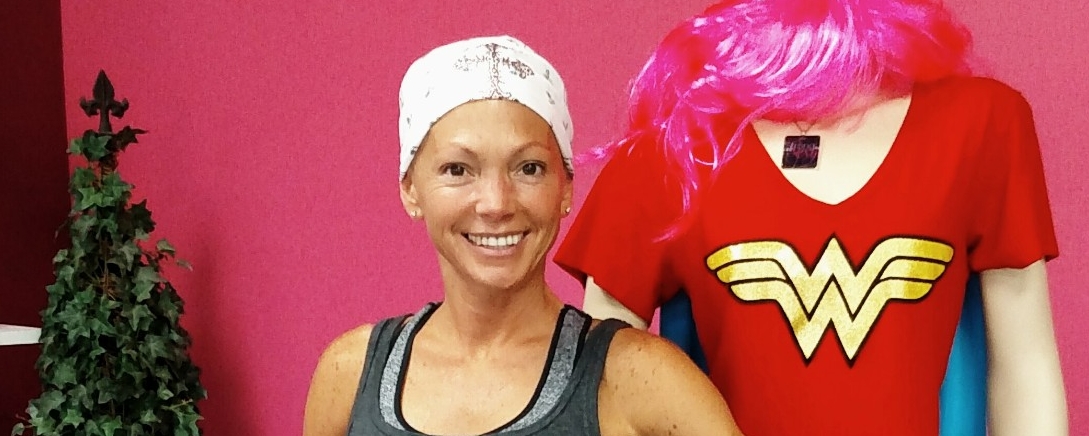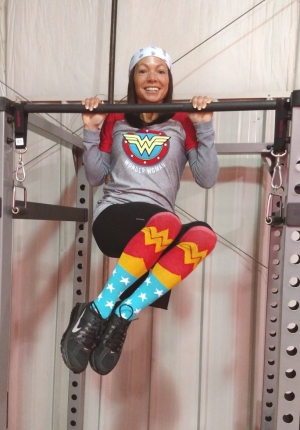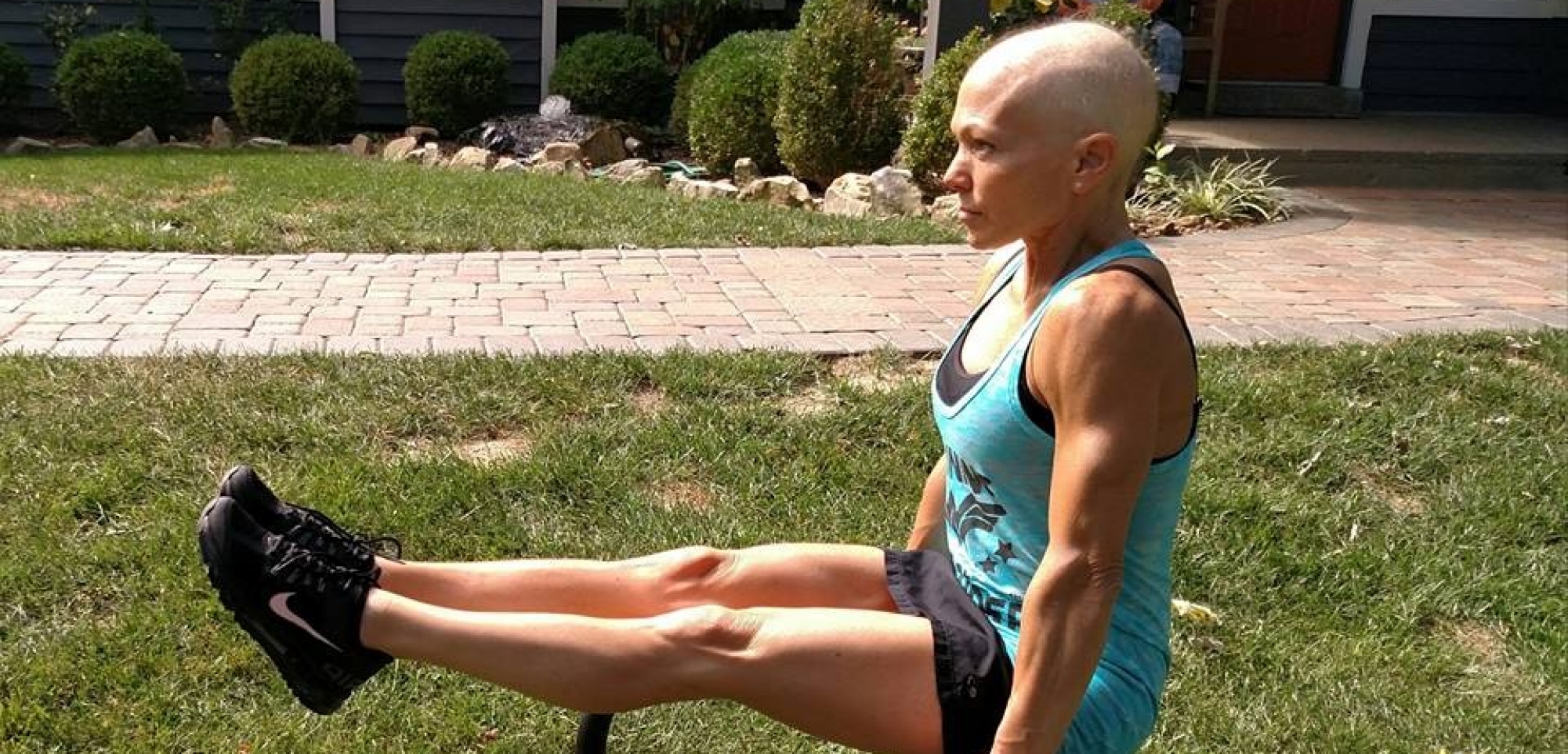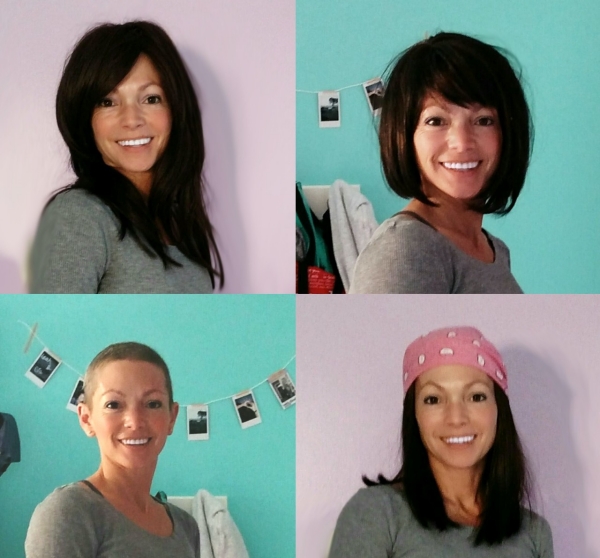Underhill's Uphill Battle
For Beth Underhill, 47, fitness is life.
It’s how she stays motivated and earns her living running her studio, Bella Forza Fitness.
It’s also what helped keep her going during treatment for cancer.
While Underhill was diagnosed with endometrial cancer in May 2015, after experiencing some ongoing vaginal bleeding and cramping, it was something that she said she should have seen coming.
“There was a family history of cancer—my father’s mother had a brain tumor and my dad had kidney cancer; my mom had breast cancer. My younger sister also just experienced endometrial cancer, so there was an obvious genetic tie,” she says.
Endometrial cancer starts when cells in the inner lining of the uterus (endometrium) begin to grow out of control.
However, Underhill didn’t think this diagnosis applied to her at first.
“I was training for a body building competition, so at first, I thought I may have just lifted too hard, but I began getting sharp pains in my pelvic area, which I thought could be appendicitis,” she says.
A trip to her gynecologist led to blood work that showed it could be early menopause but follow up tests were ordered to confirm.
“I honestly didn’t think it was anything, and we were planning to leave for Florida, so I postponed the tests until we returned,” she says. During this time, the pain and the bleeding continued.
Follow up ultrasounds and tests showed nothing, and so, a Pap test was ordered.
“I saw Dr. (Dana) Lovell, and I bet I spent 45 minutes before the test trying to convince her that it was just my weight training,” she says. “I was feeling fine—maybe just tired.”
But Lovell, an assistant professor in the Department of Obstetrics and Gynecology at the UC College of Medicine and a UC Health physician, saw something else—a lesion that was causing the bleeding.
“I knew that wasn’t good, and that’s when I started to think about all of the family history,” she says, adding that her sister had been diagnosed with Lynch syndrome which caused her endometrial cancer.
Lynch syndrome is a dominant genetic condition that has a high risk of colon cancer as well as other cancers including endometrial, ovary, stomach, small intestine, hepatobiliary tract (kidney), upper urinary tract, brain and skin cancers.
Days later, Lovell, who had done a biopsy on the tumor, called Underhill for a follow up appointment to discuss the results.
“I knew that appointment was another bad sign, and sure enough, the tumor was malignant,” Underhill says.
The Treatment Plan Put Into Motion; The First Tears Shed
Underhill was referred to Heather Pulaski, MD, assistant professor in the Department of Obstetrics and Gynecology and a gynecologic oncologist with UC Health and the UC Cancer Institute, who helped her weigh her options, surgery being at the top of the list.
“I just wanted to begin the process and deal with what I needed to get through it,” she says. “I didn’t shed a tear initially. I felt like I was numb to all of it. I was thinking, ‘I have a husband (David), a daughter (Gia) and a business I have to worry about, so I just need to get through this.’”
A radical hysterectomy was scheduled for June.
“I just knew that was the game plan, and there wasn’t any other option,” she says. “One thing that really stuck out to me was Dr. Pulaski holding my hand when they wheeled me back to surgery and saying, ‘I will do everything in my power to do what I need to do to help you be OK.’ And that was the first time I cried. With that action and those words, she showed me that I wasn’t just a number—I wasn’t just another patient. She truly cared.”
However, during surgery, another unpleasant surprise was discovered: the cancer had spread to Underhill’s lymph nodes, and chemotherapy would be required.
"I didn’t shed a tear initially. I felt like I was numb to all of it. I was thinking, ‘I have a husband, a daughter and a business to worry about, so I just need to get through this.’"
- Beth Underhill
Underhill to Speak at Opening of New Clinic

The UC Cancer Institute Gynecologic Oncology Center is hosting an open house of its newly renovated clinic and infusion center in West Chester from 6 to 7:30 p.m., Monday, May 16, 7675 Wellness Way, Suite 202. Beth will be sharing her story at the event. Attendees will be able to tour the clinic, meet physicians and staff and enjoy light refreshments. For more information, call 513-475-4880.
“Out of the whole experience, it was the one thing I didn’t want to endure,” she says. “I thought they could remove the tumor, and I’d be done, but now, I’d have to have chemotherapy, too, and lose my hair. While I was upset, I was also thinking about some of the procrastinating I’d done, and I was so glad I hadn’t waited any longer to see my physician. It could have been much worse.”
Underhill began chemotherapy treatment one day every three weeks for three cycles prior to radiation treatment and three cycles after.
“The nurses at the in West Chester infusion were fantastic, and I really appreciated their sense of humor,” she says. “They would tease David because he would always nap during my treatments. They would even reserve the same chair—my chair, chair No. 6—for me in the infusion suite, so I’d know where I’d be sitting each time. It was like my own feng shui, and it really helped me mentally. The care they provided is a true testament to the type of care that is provided throughout the institute and the whole health system.”
Unfortunately, Underhill did lose her hair initially, but with use of a cold cap—a tightly fitting, strap-on hat filled with gel that’s chilled to between -15 to -40 degrees Fahrenheit— she was able to keep what grew back between her third and fourth treatment, during the pause for radiation therapy.
The caps work by narrowing the blood vessels beneath the skin of the scalp, reducing the amount of chemotherapy medicine that reaches the hair follicles. With less chemotherapy medicine in the follicles, the hair may be less likely to fall out.
Genetic Culprits Discovered, Radiation and Remission
Underhill had genetic testing at this time. It showed that she, too, had Lynch syndrome, like her sister.
“Out of five kids, my sister and I both had the gene,” she says.
Underhill also had five weeks of radiation. Jordan Kharofa, MD, assistant professor in the Department of Radiation Oncology at the UC College of Medicine and a UC Health and UC Cancer Institute physician, oversaw this arm of her treatment.
“I loved him and his staff,” she says. “He also saw me cry. The funny part about this whole journey was the only times I cried was around my care team. It showed me that I was truly able to let down my guard and trust them with my health.”
But Underhill was still fighting for herself, as well.
“Dr. Kharofa told me that I may not feel like doing the same things I’d always been able to do, like lifting as heavy of weights as I had in the past, but I showed him, and on my next trip in to see him, I let him see the pictures to prove it,” she says. “I decided early on to have a sense of normalcy and beat this as quickly as I could. I didn’t place any limitations on myself.”
After her last treatments and a CT scan December 28, 2015 to look at her progress, she went for a follow up appointment. As a New Year’s present, Underhill was told she was in remission.
“I was almost in disbelief,” she says. “I went from so much going on in my life to it being over like that. It was an adjustment for me. They called me ‘Wonder Woman’ when I was going through it all—something like this brings out the best and worst in a person—but I remained positive, and I made it through to where I am today.”
Looking for the Warning Signs: The Life of a ‘Previvor’
While Underhill has a happy ending, her genes may have a different story to tell. Her Lynch syndrome unfortunately puts her at risk for other cancers, and so while she’s a ‘survivor’ she’s also a ‘previvor,’ says Pulaski.
“Cancer previvors are individuals who have not yet had a cancer but are at high risk for developing the disease; in Beth's case, she has a she has a high chance of developing colon cancer at some point in her life, and so could consider herself a colorectal cancer previvor,” she says. “While this knowledge can be overwhelming, it is why genetic testing is wonderful because it provides information like this to keep patients informed. Coupled with knowledge of family health history, it gives patients the chance to have more aggressive screening so cancers can be prevented or they can fight cancer off at the earliest stages."
Right now, Underhill is focusing on spending as much time with her family and on her business as she can. She also tries to inspire patients who may be going through the same things she went through by sharing her story as often as possible.
"There needs to be more awareness of gynecologic cancers,” she says. “I’m just so glad I had the support from my team at the UC Cancer Institute. Dr. Pulaski, her assistant, Drs. Kharofa and Lovell, and the whole team at the Barrett Center—everyone was just so compassionate and empathetic. They made me feel almost like there wasn’t anything wrong. The comfort they provided helped me continue to stay strong and live the life I’m supposed to live.”
by Katie Pence, Academic Health Center 513-558-4561
May 2016

“They called me ‘Wonder Woman’ when I was going through it all—something like this brings out the best and worst in a person—but I remained positive, and I made it through to where I am today.”

